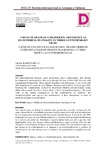Voices of Silenced Childhoods: Transience as Decentering Spatiality in Three Contemporary Films

View/
Use this link to cite
http://hdl.handle.net/2183/27877
Except where otherwise noted, this item's license is described as Atribución-CompartirIgual 4.0 Internacional (CC BY-SA 4.0)
Collections
Metadata
Show full item recordTitle
Voices of Silenced Childhoods: Transience as Decentering Spatiality in Three Contemporary FilmsAlternative Title(s)
Voces de una infancia silenciada: transitoriedad como espacialidad descentralizadora en tres películas contemporáneasAuthor(s)
Date
2021-03-09Citation
Barros Grela, E. (2021). Voces de una infancia silenciada: transitoriedad como espacialidad descentralizadora en tres películas contemporáneas. DIGILEC: Revista Internacional de Lenguas y Culturas, 7, 1-10. https://doi.org/10.17979/digilec.2020.7.0.7085
Abstract
[Abstract] The interconnection between space production, place configuration, and identity development is interrogated in this essay through the lens of three film directors with transnational backgrounds. These auteurs introduce with Huelepega: La ley de la calle (Elia Schneider), Le temps du loup (Michael Haneke), and Children Underground (Edet Belzberg) the complications accrued by abandoned children and problem young adults whose erratic lives have forced them to dwell in transitional places. This essay looks at the spatial consequences of the confrontation of childhood and reterritorialization, and explores the ramifications of these interactions in terms of spatiality and place resignification. [Resumen] Este artículo pone en diálogo la relación entre producción espacial, configuración del lugar y desarrollo de la identidad, para cuestionarla a través de la óptica de tres directores de cine de procedencia transnacional. En sus películas Huelepega: La ley de la calle (Elia Schneider), Le temps du loup (Michael Haneke) y Children Underground (Edet Belzberg) estos autores presentan las dificultades experimentadas tanto por niños que han sido abandonados como por jóvenes adultos problemáticos, cuyas erráticas vidas los han obligado a vivir en lugares de transición. Este ensayo analiza las consecuencias espaciales que surgen de la confrontación de la infancia y su reterritorialización, y explora las ramificaciones de estas interacciones en términos de espacialidad y resignificación del lugar.
Keywords
Space
Childhood
Deterritorialization
Transience
Film
Espacio
Infancia
Reterritorialización
Transitoriedad
Cine
Childhood
Deterritorialization
Transience
Film
Espacio
Infancia
Reterritorialización
Transitoriedad
Cine
Editor version
Rights
Atribución-CompartirIgual 4.0 Internacional (CC BY-SA 4.0)
ISSN
2386-6691






